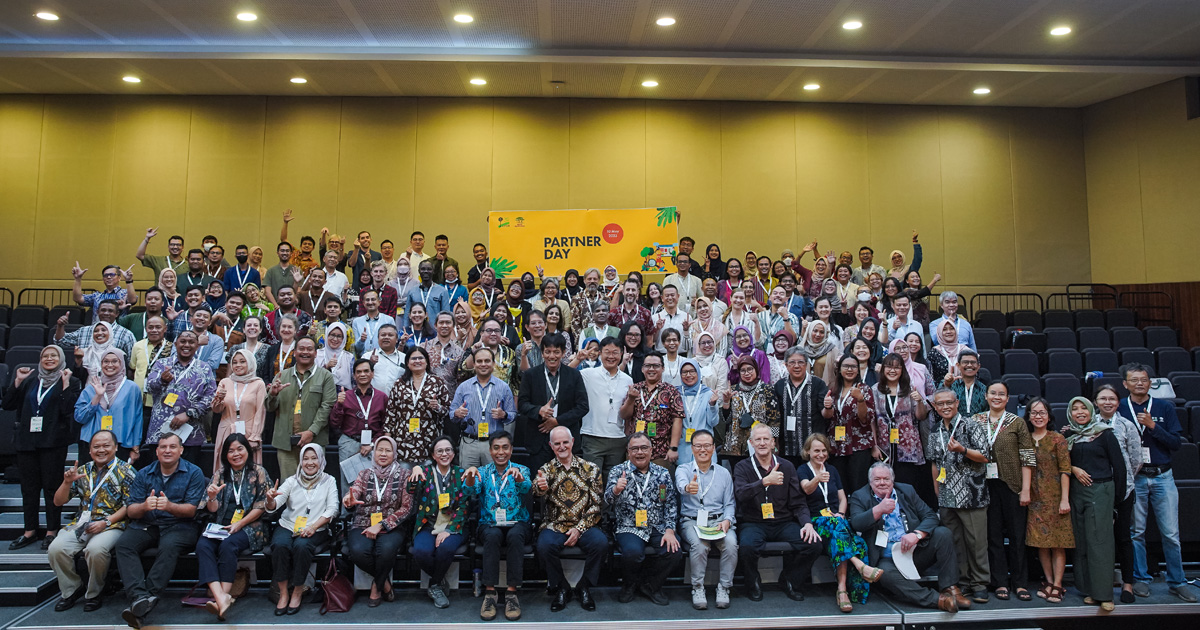
By Nabiha Shahab
The Center for International Forestry Research and World Agroforestry (CIFOR-ICRAF) held a new event called ‘Partner Day’ during its 2023 edition of Science Week on May 10th.
Science Week, an annual event, brings together CIFOR-ICRAF’s staff from all over the world to exchange knowledge and insights on crucial global issues within their mandate. This year’s theme, ‘Equity in Action’, provided a unique opportunity to learn about CIFOR-ICRAF’s commitment to equity and inclusion and how their work addresses the global challenge of inequality in collaboration with communities, partners and governments.
The inaugural Partner Day celebrated the contributions of CIFOR-ICRAF’s work with partners to just transitions and equitable transformations in Indonesia. It showcased and reflected on achievements to date, explored ways to enhance existing partnerships and identified new areas for future collaboration.
“The partnership that has been built, has certainly been a powerful one, with personal relationship, friendship and innovation. We are all friends here, we all partners and we are working for the future,” said Robert Nasi, CIFOR-ICRAF’s Chief Operating Officer (COO) in a welcome address, highlighting the significance of the organization’s work in Indonesia for the global forest sector.
“To ensure sustainability, overcoming intergenerational conflict is vital, and a social system that supports decision-making which takes into account the benefits to future generations is critically important,” said Arif Satria, the rector of Bogor Agricultural University (IPB) – one of CIFOR-ICRAF’s strategic partners engaged in collaborative projects to promote sustainability sciences – in a keynote speech.
IPB is part of the Trade Hub consortium led by CIFOR-ICRAF in Indonesia, which aims to promote sustainable trade and address challenges faced by smallholder farmers in the palm oil sector, explained Satria, adding that IPB’s activities there include capacity building, strengthening programs and the development of knowledge products.
Ary Sudijanto, Director-General of the Agency for Standardization of Environment and Forestry Instruments (ASEFI), recognized the longstanding collaboration between the Indonesian government and CIFOR-ICRAF in addressing challenges and improving the country’s forestry sector. “The form of cooperation that is carried out is not only research, but also capacity building, information and expertise exchange,” he said. “The locus of cooperation covers several regions spread throughout Indonesia.”
He listed some key activities that have resulted from the partnership, including the development of the Indonesian National Carbon Accounting System (INCAS), the Haze Free Sustainable Livelihoods Project (HFSLP), the Sustainable Wetlands Adaptation and Mitigation Program (SWAMP), the improvement of governance, policy and institutional arrangements for UN-backed climate mitigation scheme REDD+ and the national arm of the Global Comparative Study on REDD+.
Collaboration for regional green growth planning
In a panel focusing on promoting green growth for improved food security and livelihoods, speakers explored different green growth strategies and initiatives being implemented with the support of research conducted in partnership with CIFOR-ICRAF. The partners shared their experiences in implementing approaches towards sustainable land use and management, improving food security and livelihoods.
Regina Ariyanti, Head of the Regional Planning Agency (BAPPEDA) for South Sumatra, shared insights into the collaboration between the provincial government and CIFOR-ICRAF in the development of a master plan for green growth in the province. She recalled how the partnership began when South Sumatra was hit by severe forest fires in 2015. “ICRAF calculated how much [carbon] loss occurred due to forest fires in the province and helped address some of the challenges from being put in the spotlight, since South Sumatra contributed a lot to smoke and haze at the time.»
One of the current initiatives to reduce emissions is the provincial REDD+ project. The province has received a challenge from the president to keep economic growth in line with emission reductions. This means that economic growth of 7% must be achieved alongside emission reductions of 29%, with an additional contribution of 41% from other countries, said Ariyanti.
Panels on restoration and trade
The afternoon of Partner Day opened with a panel on landscape restoration, with a particular focus on carbon-rich ecosystems like wetlands – including peatlands and mangroves – which face significant pressure for conversion to other uses. Restoring these ecosystems is crucial for mitigating climate change and sea-level rise. The panel discussed mitigation and adaptation measures, highlighting their potential to improve the livelihoods of local communities.
The last panel of the day focused on trade and the new EU anti-deforestation regulation. The trading bloc recently issued a new law to prevent companies from trading commodities linked with deforestation and forest degradation within or from the EU. The session focused on navigating the new regulation, its implications, and the way forward for global trade, the environment, and smallholder farmers. Insights were shared from consumer and producer countries, civil society organizations (CSOs) and research organizations, with palm oil and timber highlighted as case studies.
Overall, Partner Day provided CIFOR-ICRAF with an opportunity to showcase and reflect on how its work addresses the global challenge of inequality – a central focus of its strategy for 2020-2030. The event served as a platform to celebrate existing partnerships, discuss ways to strengthen them and identify new areas for future collaboration.












